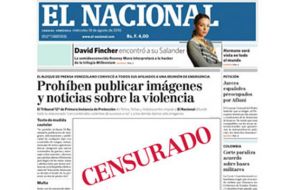MercoPress. South Atlantic News Agency
Printed media also victim of Venezuelan rampant crime
 Front page of El Nacional with the censored empty spaces
Front page of El Nacional with the censored empty spaces A judge in Venezuela has ruled that all printed news media cannot publish “violent, bloody or grotesque” photographs for the next 30 days because the pictures can cause psychological and moral harm to children.
Tuesday's decree by Judge William Paez Jimenez, which specifically mentioned the El Nacional and Tal Cual daily newspapers, comes amid growing government sensitivity to news reports of rampant crime in the country.
The ruling occurred in response to a complaint by three citizens about a front-page color photograph of the inside of a morgue that El Nacional published Friday, the court ruling said. Tal Cual published the photo Monday.
The photograph showed about a dozen bodies, mostly naked, sprawled on tables at a morgue in Caracas. It ran alongside a story about violence.
“[The court] imposes this protective action in favor of the collective children and adolescents who live in the Bolivarian Republic of Venezuela, for the violation and the threat to their health rights, to their physical, psychological and moral integrity, as well as receiving information adequate to their integral development” the 10-page ruling said.
According to a report from CNN, Miguel Otero, the editor and owner of El Nacional, said he published the photo to stir debate about crime in the country.
“The editorial reasoning behind the photo was to create a shock so that people could in some way react to a situation that the government has done absolutely nothing about”.
Otero called the government's response “disproportionate.”
Otero said photos like the one El Nacional published are printed regularly in other media, just not as prominently as in his newspaper.
“The state of personal security in Venezuela is an absolute chaos, and the numbers rise, rise and rise to the point they are out of control,” he said. “People are assaulted everywhere, and the police [don't] do anything.”
The government has said the morgue is in much better condition than shown in the photo, which officials contend was taken years ago.
Otero said the newspaper made it clear the photo was taken in December 2009.
Chavez, who says violent crime in Venezuela is falling, has accused the opposition of trying to exaggerate the issue. Security concerns are of particular interest now, a little more than a month before Sept. 26 parliamentary elections.
Some observers noted Wednesday that the 30-day ban will cover most of the pre-election period.
Chavez's reaction to press criticism also drew the attention of The Economist magazine, which published an Aug. 16 article titled “Shooting the Messenger.”
The magazine noted that CNN en Español broadcast a Spanish documentary last week that investigated violence, guerrilla movements and state militia operations in Venezuela. The documentary and CNN-produced companion pieces ran over a six-night period on the network.
“Even by official figures, Venezuela's murder rate is shocking,” The Economist article said. “In the first 11 months of 2009, according to the interior ministry, there were 12,257 homicides. Independent experts put the figure at around 16,000 a year, more than three times as many as in 1998, the year before Chavez came to power. That is a rate of around 57 per 100,000, one of the world's highest.”
Venezuelan officials contend the press reports are aimed at discrediting the government before next month's elections.
In a comment to the state-run VTV station, Chavez called the reports “desperate” acts by “right-wing sectors.”
“I've recently heard spokespeople for the opposition as desperate,” the government's ABI news service reported Chavez as saying. “Now that they have five weeks left and they have seen the numbers, the polls, the projections and they are desperate. It's noteworthy that spokespeople for the counterrevolution criticize us on the topic of public security, but we take responsibility and are working to correct our faults.”
Chavez also said that opposition governors in Carabobo, Miranda and Zulia states have large police forces but still are unable to lower the crime rate.
Cabinet member Gabriela Ramirez, whose title is defender of the public, said El Nacional ran the morgue photo to boost its circulation, which she claimed was flagging.
The bodies at the morgue, she said, belonged to accident victims or people who had killed themselves.




Top Comments
Disclaimer & comment rulesCommenting for this story is now closed.
If you have a Facebook account, become a fan and comment on our Facebook Page!